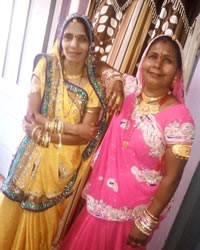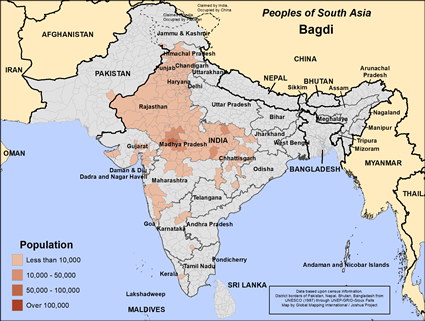Bagdi in India

Photo Source:
Manish Bagdi Lakhera - Pexels
|

Map Source:
People Group data: Omid. Map geography: UNESCO / GMI. Map Design: Joshua Project.
|
| People Name: | Bagdi |
| Country: | India |
| 10/40 Window: | Yes |
| Population: | 352,000 |
| World Population: | 352,000 |
| Primary Language: | Hindi |
| Primary Religion: | Hinduism |
| Christian Adherents: | 0.00 % |
| Evangelicals: | 0.00 % |
| Scripture: | Complete Bible |
| Ministry Resources: | Yes |
| Jesus Film: | Yes |
| Audio Recordings: | Yes |
| People Cluster: | South Asia Dalit - other |
| Affinity Bloc: | South Asian Peoples |
| Progress Level: |
|
Introduction / History
The Bhil are the third largest and most widely distributed tribal group in India. Although the Bhil were once thought of as a single tribe, it is now clear that they consist of many subgroups, one of which is the Bagdi, who live further east than the other Bhil groups. They live mainly in West Bengal. The name "Bhil" was probably derived from the word villu or billu, which in most Dravidian languages is the word for "bow. " The bow has long been a characteristic weapon of the Bhil because the tribesmen always carry their bows and arrows with them. Many years ago, Bhil rajas (kings) permitted immigrants from the plains to settle in the hill regions. To safeguard their independence and rule, the Bhil fought against powerful Empires: the Moghals, the Maratha and the British Raj. The Bagdi are labeled a "scheduled tribe," meaning that they have low status. Being part of a scheduled tribe means that they have special privileges. Their language, Bhili, is a blend of Gujarati and Marathi, the two major languages in their region. The Bagdi also speak Hindi, a major language throughout northern India.
What Are Their Lives Like?
The Bagdi were traditionally hunters and gatherers. They relied primarily on bows and arrows for hunting, although spears, slings, and axes among their tools. They gathered edible plants, roots, and fruits from the forests. Unfortunately, extensive deforestation in this region has greatly diminished the forest resources. As a result, most of the Bagdi are now settled small time farmers. Their primary crops include maize, millet, cucumbers, cotton, wild rice, lentils, and barley. Some of the Bagdi have lost their land and now earn a living as hired laborers. Many of them have found jobs clearing forests or repairing roads. Since the Bagdi do not weave cloth, make pottery, or work with metals, they are dependent on trade to obtain these types of items. The Bagdi mark their village boundaries by tying bundles of grass to trees along the paths. Each village usually contains from three to forty families. The villagers live in houses that are set far apart from each other. Most of the houses are built on hills with their fields surrounding them. Most villages also have some land that is reserved for community use. The Bagdi live in wooden framed, rectangular homes that generally have two stories. The houses have bamboo walls daubed with plaster that is made of water, clay and cattle dung. Such materials keep the houses cool. The homes do not have windows and have only a single entrance on the front wall. The roofs are usually thatched with grass or teak leaves and bamboo, materials that often require annual replacement. The father is the head of the Bagdi household, distributing the daily work among each of the family members and controlling all the income. The mother assigns duties to her daughters and daughters-in-law and supervises their work. These duties include preparing the family's meals and taking them to the men in the fields. Drawing water, milking cows and gathering firewood are also part of the women's daily routines. Men do the plowing, sowing and hunting. The Bagdi are divided into clans, each of which is led by a chief. The chiefs have supreme power in matters concerning the clan. Since the clans are often geographically separated, the main purpose of the clan seems to be ensuring exogamous marriages (marriages between members of the same clan) and identifying the proper lines of descent.
What Are Their Beliefs?
The Bagdi practice a mixture of Hinduism and folk religion. They worship the Hindu gods but believe that spirits inhabit nature in the sea, rivers, animals, and sky. If the Bagdi do not appease these spirits with rituals, prayers and offerings, the evil spirits will bring disaster upon their people.
What Are Their Needs?
Christian believers who are filled with the fruit of the Holy Spirit are needed to share God's love with the Bagdi. Prayer is the first step toward seeing them reached with the truth of the gospel.
Prayer Points
Pray for the Bagdi people to have hearts that are open to the abundant blessings of Jesus Christ. Pray for Bagdi families to prosper financially and spiritually as they experience a relationship with Jesus Christ. Pray for a movement among the Bagdi that will spread joy, peace and salvation to other peoples in Rajasthan. Pray for the Bagdi culture to be renewed and enhanced by a work of the Holy Spirit and shaped into a God-centered and God-honoring mold.